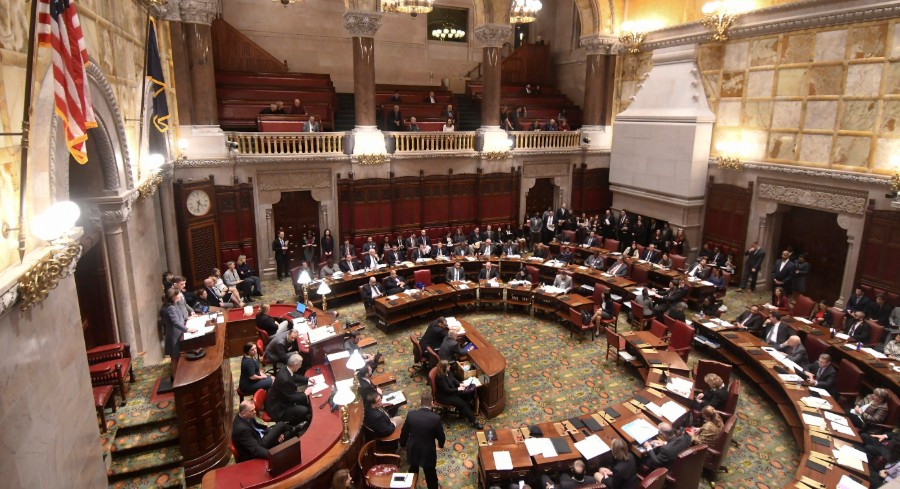 |
Trump Must Pay E. Jean Carroll $83.3 Million for Defamation in Rape Case |
Today she’s typically described as a former advice columnist, but that term doesn’t really do justice to E. Jean Carroll’s career pre-Donald Trump.
Long before she was one of the longest-serving advice columnists in America, Ms. Carroll blazed trails as a gonzo-style journalist The Times once called “feminism’s answer to Hunter Thompson.”
She profiled Lyle Lovett and went camping with the notorious New York curmudgeon Fran Lebowitz for a cover story in Outside. She wrote a famous piece on Dan Rather for Esquire, appeared in the “Best American Crime Writing” and was the first female contributing editor at Playboy — back when people really did read it for the articles.
Today, at best, she’s the former Elle advice columnist E. Jean Carroll. At worst, she’s the crazy Trump rape lawsuit lady. Or, as she put it in court recently: “Previously, I was known simply as a journalist, and now I’m known as the liar, the fraud and the wack job.”
For weeks now, there have been endless predictions about what the outcome of Ms. Carroll’s lawsuit against the former president might mean for him — his candidacy, his many ongoing court cases, his wallet, his ability to shut up. Now that we have a verdict, we’ve gotten the answers, or at least some of them: He will be $83.3 million poorer and seems to have stopped insulting her as a result. For now, at least.
But as I sat in court in Manhattan last week, watching Mr. Trump glare and mumble at the back of Ms. Carroll’s head — she sat two rows in front of him, pin straight in her chair, the first time she’s been near this man in nearly 30 years — I couldn’t stop thinking that this trial was also about something else: the value of a woman, long past middle age, who dared to claim she indeed still had value. Just how radical was it for Ms. Carroll, 80, to demand that she was worth something?
To understand this aspect of the trial, mostly overlooked by a courtroom packed with political reporters, it helps to review what the case was not about. As the judge said repeatedly, the case was not meant to relitigate whether the 1990s assault in a Bergdorf Goodman dressing room occurred. That was decided in a separate trial last May, when a jury of nine found Mr. Trump liable for sexual abuse when he pinned Ms. Carroll against a wall, pulled down her tights and stuck his fingers into her vagina. The jury in that case also found that he defamed her when he called her a liar and the whole thing a hoax.
What this jury was to decide was how much Mr. Trump should be punished for continuing to repeat those falsehoods, as well as what it would cost to compensate Ms. Carroll for both the emotional damage inflicted by years of being a target of a former U.S. president (she sleeps with a gun beside her bed) and the loss of her reputation as a journalist whose livelihood relied on trust and facts. After a short deliberation, the jury awarded her $65 million in punitive damages, finding Mr. Trump had acted with malice, as well as $18.3 million for emotional harm and reputational damage.
It’s that last part that Mr. Trump’s lawyer Alina Habba seemed intent on demeaning and diminishing — attempting to paint Ms. Carroll as a faded careerist whose rape claim was a last-ditch effort to re-establish her career. In fact, Ms. Habba argued in cross-examination, hadn’t Ms. Carroll’s reputation improved? She had more Twitter followers now and famous people commending her; after being fired from Elle, she took her advice column to Substack, where she now makes more money. Wasn’t that pretty good for somebody who might otherwise, say, be at home knitting with her cats?
After noting Ms. Carroll’s current income, Ms. Habba continued, “I hate to ask you this, Ms. Carroll, but how old are you?”
“I’m 80,” Ms. Carroll replied coolly, repeating what everyone in the courtroom already knew.
“And that’s more than you were making in 2018,” before the accusation? Ms. Habba asked.
“Yes,” Ms. Carroll said.
When I talked to Deborah Tuerkheimer, a law professor at Northwestern whose book “Credible” examines why we disbelieve allegations of sexual abuse, she told me that Mr. Trump’s team was “trying to show that she was already past her prime,” that she had “withered on the vine and so whatever was left of her wasn’t enough to warrant a hefty damage award.”
She also told me there is no precedent for a case like Ms. Carroll’s, in part because it is so unusual for a woman her age to come forward. Part of that has to do with stigma (people are deeply uncomfortable with the combination of older women and sexual assault, and Ms. Carroll was 52 when the assault took place) and also with statutes of limitations. But it makes her “all the more radical,” Ms. Tuerkheimer said — an 80-year-old woman proclaiming she wasn’t done yet, that her reputation was worth something and that she was owed money from the person who’d trashed it.
“Ageism” is not a word that’s been used much in either of Ms. Carroll’s cases. But age — how it shaped her behavior in the aftermath of the assault, how it eventually propelled her to come forward and how it has been used to discredit her — has been an undercurrent of her story from the beginning.
Ms. Carroll got her break in journalism in the 1980s, at a time when few women were doing the kinds of first-person stunts for magazines like Rolling Stone and Esquire that she was. Her assignments often put her in precarious situations: trekking through the mountains of Papua New Guinea for a Playboy article, “In Search of Primitive Man,” or in a hot tub with Hunter S. Thompson, who sliced off her clothes with a knife. (She has said they were “semi-intimately involved” and did acid together.)
Part of what made her so good at the work was her thick skin, her unflappable nature — character traits that would come back to haunt her — and part of it was her willingness to be outrageous, to do anything for the story. But as every good advice columnist knows, people contain multitudes; they can push boundaries in some ways and bend to the standards of the day in others.
During the first trial, Mr. Trump’s lawyers zeroed in on these contradictions. Why, his lawyers asked, peppering her with questions to the point of tears, didn’t she scream when Mr. Trump attacked her? Why didn’t she file a police report or see a therapist? How could she possibly have laughed on the phone with her friend Lisa Birnbach, whom Ms. Carroll called that day to tell what happened, and who didn’t tell another soul about it for more than 20 years?
“I was born in 1943. I am a member of the silent generation,” Ms. Carroll testified. “Women like me were taught and trained to keep our chins up and to not complain.” She didn’t scream in that department store dressing room, she said, because she “didn’t want to make a scene.” She laughed when Mr. Trump attacked her because “laughing is a very good — I use the word ‘weapon’ — to calm a man down if he has any erotic intention.” She went back to Bergdorf Goodman, repeatedly, in order to prove a point: It was her favorite store, and she was not going to let him take that from her — something I witnessed when I first met her, on a street corner three days after the accusation, and she grabbed my hand and led me to where it happened. As Ms. Birnbach put it when she testified in the first trial, Ms. Carroll is the kind of person who “puts on lipstick, dusts herself off and moves on.”
Which is exactly what she did, for more than two decades. Even after she came forward in 2019, Ms. Carroll was hesitant to call herself a victim or her rape a rape. The first time I interviewed her, she couldn’t say the word out loud; she whispered it to me from across the table. “I like the word ‘fight,’” she told me. “That’s how I like to say it. Not a rape. To me, it’s a fight, because I didn’t just stand there.” She was not part of a generation of women who shouted about their abortions or talked about their assaults out loud.
And yet even now, even after we supposedly do know that anybody can be assaulted — that you don’t have to be young or hot — it was sobering to watch as her own legal team seemed to take every opportunity to remind the jury that she was once that: displaying her headshots, her book covers, the now infamous black-and-white photo of her laughing with Mr. Trump (the one in which he later confused Ms. Carroll for his ex-wife Marla Maples), as if to say, “See? She could have been his type.”
What makes what Ms. Carroll did so remarkable is that she was, of course, worth less in the eyes of the world now than she was in her prime. She wasn’t retired — “Never,” she told me — but she certainly wasn’t trekking across the jungle in search of primitive man, and the hundreds of letters to her advice column each week asking her how to find a good man had tapered to a trickle. The chutzpah required, after all of that, and in the face of both her biological reality and a culture that most certainly doesn’t look kindly on women her age, to still insist she was worth something … it was ballsy enough to be almost Trumpian. Until, of course, you appreciate that a fight over the financial value of a reputation at age 80 is really less about your earnings and more about your dignity.
If age has in some ways been a hurdle for Ms. Carroll to overcome in this case, I’d like to think that it was also age that let her see it through to this conclusion. That it was age and wisdom and the confidence that comes along with it that allowed her to make the genuinely audacious claim that an 80-year-old woman still has good, creative, vivacious, maybe even profitable years ahead of her.
“I couldn’t have done it back then,” she once told me, of coming forward sooner. “I didn’t have the guts.”
But now? “It was just time. It was time,” she testified.
After the verdict on Friday, I rode in a town car uptown with one of her sisters and Ms. Birnbach. They were en route to the offices of Ms. Carroll’s lawyers, where they planned to celebrate the verdict with Veuve Clicquot. Her sister scrolled through reactions to the verdict on social media and began to read them aloud.
“Hero.” “An inspiration to women.” “Accountability.”
And then, predictably: “Deranged old hag.”
The difference, from just a few minutes before, was that they could laugh about it now. There were worse things to be.
https://www.nytimes.com/2024/01/29/opinion/e-jean-carroll-audacity-donald-trump.html















